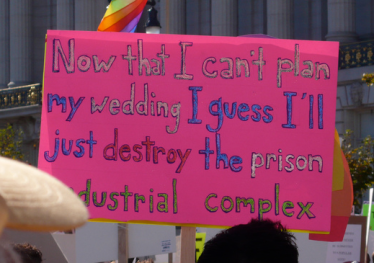The results are in, the markets have panicked, Prime Ministers have stepped down, and no one seems brave enough to press “the big red button” of officially informing the EU that the UK intends to leave. In short, the public referendum to see if the UK would prefer to leave or remain in the EU has been a bit of a mess.
Funnily enough, with support for leave tanking in the wake of several walked back promises on public funding and bans on further immigration, it appears that the vote on the UK’s future in the EU will actually have the greatest impact on the different parts of the UK’s relationships with each other. What’s leaped out at many is the divide between the vastly greater voter pool that is England (which voted in almost all its subdivisions to leave) and the rather different returns among the smaller populations in Northern Ireland and Scotland (both of which decisively voted to remain).
Out of that has come talk of a border referendum in Ireland and renewed interest in Scottish independence. Departition and separation serve on the one hand as vehicles to avoid leaving the EU or speed the process of reentry, but also demonstrate a vulnerability of the UK. On the one hand, it now functions as a democracy, but on the other not only must it wrestle with a past of global colonial violence but modern borders drawn by those processes applied to what once were neighboring nations. One’s former colonial subjects seldom vote to withdraw from the world hand-in-hand with their on-going occupiers.
With a slim majority also voting to leave within Wales, it’s easy to instead summarize the regional differences in the vote as being between north and south rather than colonized and colonizer. That misses some of the complexities of the Welsh vote, which are not only key to understanding what happened there but help contextualize the successes of remain and meaningfulness of the EU to Northern Ireland and Scotland.
Immigration
One of the most decisive discrepancies between how those in England and those in Wales decided to vote on this referendum was in terms of immigration. Especially at the end of the campaign, that issue became squarely central, with EU membership being conflated with a comparatively open borders, less restricted immigration, and more generally the existence of immigrants.
In England, the implications were loud and clear to the foreign-born populations largely concentrated in London, the Southeast of England, and to a lesser extent the Southwest. In part because of immigrant voters, those would be respectively the only English subdivisions that voted in favor of remaining, in favor of leaving by less than the narrow victory in Wales, and the narrowest victory in England still larger than that in Wales. Among other factors, immigrants concerned about the rhetoric and politics of the leave campaign were a key part of the remain vote in England.
The precise opposite demographic tendency shows up in Wales, with the subdivision with the most immigrants – Powys – being the one with the largest leave-lopsided return. The trick to that is that immigrants to England tend to be also immigrants to the UK. Generally speaking, they are people of color from former UK colonies or immigrants from fellow EU countries particularly Poland and other eastern European countries. Those are the populations that have in the wake of the election faced harassment and even violence.
In stark contrast, the majority of immigrants to Wales are immigrants from wthin the UK, and overwhelmingly, they’re English. This is particularly true in, you guessed it, Powys. In stark contrast to the key importance of voters of color in London and elsewhere in England, some of the least immigrated-to parts of Wales were where remain locally won. Bro Morgannwg, Caerdydd (also known as Cardiff), and Sir Fynwy – all along Wales’ comparatively less immigrated-to southern coast – were among the five local areas where remain won.

(The percent of local Welsh populations born in England from the 2011 census.)
While immigration is fairly common even along the western coast of Wales, that is also in some ways the nationalist heart of the country – where the highest percentage of the local Welsh population has retained the use of Cymraeg, the Welsh language. That’s where the other two remain-leaning local subdivisions can be found: Ceredigion and Gwynedd.

(The cymrophone percentage of the Welsh population, according to the 2011 census.)
Speaking very generally, the most English parts of England tended to vote leave, while the most Welsh parts of Wales tended to vote remain. What was supposedly a referendum on the fate of the whole of the UK was heard very differently not just between locals and immigrants, but different groups of locals.
English colonial legacies
Much has been made about every local major subdivision of Scotland voting in this referendum to remain in the EU. While many have been quick to talk about a divergence between Northern Ireland and Scotland on the one hand and England on the other, it’s important to note that there is not the same level of uniformity in Northern Ireland’s vote.
To those familiar with the contested fate of that corner of the UK, the Brexit vote is just another confirmation of a familiar voter pattern. Stretching from Antrim then south around Belfast while dipping into that city’s eastern neighborhoods, leave won. Everywhere else in Northern Ireland, remain did.
This is a geographic manifestation of the most basic of divisions of that area, baked into the region’s uniquely power-sharing government since the Good Friday Agreement. Those now somewhat ironically called “Unionists” – largely descended from settlers affiliated with the UK’s colonial rule of the whole of Ireland – voted to leave. Those termed “Nationalists” – who typically have precolonial, Irish ethnic ties to the area – voted to remain.

While much of the analysis of this has rightly noted that there were some concrete EU policies driving those different voting patterns – from an Irish desire for harassment-free travel across the border to some unionists’ desire for an isolationist UK that may look the other way if The Troubles return – few have talked about this as a parallel to what can be seen to some extent in Wales.
English immigration is a phenomenon seen in Scotland as well, but in Wales and Northern Ireland it appears to be one more fiercely politically interested in maintaining the image of a powerful UK. It might not always find logical outlets, as the momentarily free falling pound showed, but there is a political constituency in both Northern Ireland and Wales who just seemingly demonstrated they don’t think of themselves as either of those things except in residency.
$350 to the NHS
For all their similarities, however, the voting dynamics in Northern Ireland and Wales don’t perfectly align. While high concentrations of English immigrants were what helped make some of the highest leave returns within Wales, some of the least immigrated-to portions of the country also saw leave majorities. North of Caerdydd, in the heart of Welsh coal country, immigrants from either elsewhere in the UK or the world are rarer than anywhere else in Wales. Those places form the backbone of the Welsh labor movement, which has fallen by the wayside of an inability to deliver equality and dignity amid deindustrialization. They voted last week to leave, in some places by margins not seen elsewhere in Wales.

(W. Eugene Smith’s “Three Generations of Welsh Miners” taken in 1950 in South Wales, from here.)
This is the portion of Wales most directly invested in the social services of the UK. It’s their Labour votes which propelled the so far only Welsh prime minister, David Lloyd George, into office, in which he laid the groundwork for what would become the National Health Service (NHS).
Although the agitators who forced that and similar provisions through were Welsh, the past century since that has seen the best access to those services quite clearly be designed around locations in England, not Wales. Welsh coal country may not have the worst access to NHS facilities when compared to, say, central Wales, but it remains a pressing issue that they may be redirected to an NHS location in Caerdydd, if not England itself due in part to the lack of resources in Wales.
While the leave campaign led with a dogwhistle about the NHS with mixed results in many polls, one of the places that seemingly played best was among the Welsh especially in coal country. The EU has meant free travel for Irish, and a market for recently discovered mineral deposits for Scots, but it’s been seen as part of a broader disorientating restructuring of the Welsh economy.If anywhere saw a leftist euroskepticism, it was Wales.
The largest bloc of leave voters feeling bitter about suddenly reversed promises to increase NHS funding is undoubtedly the Welsh, and now EU development grants may suddenly dry up as well. Hitched, perhaps soon without Scottish or Irish partners, to an English-led “union,” for many in Wales the lofty question of national independence and the pressing reality of poverty won’t stay two separate discussions with two separate half-successful parties to vote for (Plaid Cymru and Labour respectively).
In a strange way, these Welsh voters helped sabotage the referendum and threatened their anemic local economies, yet may have just forced their nation as a whole to take a long hard look at itself. It’s difficult to picture a Welsh economy without the benefits of the EU, but perhaps a euroskeptical outlook is what might drive Wales to or even passed independence not just from Brussels but also from London.
While Ireland has seen conflict and Scotland has actually staged votes on leaving the UK, Wales has dallied in more gray zones of devolution and greater local autonomy. Tethered to a tanking UK economy, suddenly desperate for a way to outvote English people caught in a frenzy of xenophobia and imperialism reminiscence (that may very well turn on Welsh), and lied to about increased funding for social services – what part of all that tells Welsh people not to start thinking more drastically?
Last week’s vote revealed the several deep tensions within the UK. What’s easy to recognize is how there is already an independent Ireland (and a campaign for its expansion) and a Scottish Nationalist Party. This was blatantly a demonstration of how English people’s politics and theirs diverge. It’s harder to sort through, because it’s more effectively masked, but there’s a lingering echo of the same sentiment in Wales. Whether it can emerge into that level of separatism is a question only time will tell.

 Left, 2012 chlorpyrifos use in the western US, from
Left, 2012 chlorpyrifos use in the western US, from 









